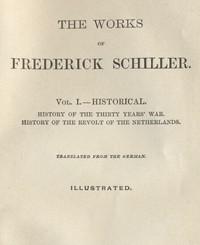Read this ebook for free! No credit card needed, absolutely nothing to pay.
Words: 25064 in 4 pages
This is an ebook sharing website. You can read the uploaded ebooks for free here. No credit cards needed, nothing to pay. If you want to own a digital copy of the ebook, or want to read offline with your favorite ebook-reader, then you can choose to buy and download the ebook.


: History of the Revolt of the Netherlands — Volume 02 by Schiller Friedrich - Netherlands History Eighty Years' War 1568-1648; Huguenots
Edition: 10
CARDINAL GRANVELLA.
Granvella opened his new career at once with the greatest masterpiece of political genius, in passing so easily from the favor of such a father into equal consideration with such a son. And he soon proved himself deserving of it. At the secret negotiations of which the Duchess of Lorraine had, in 1558, been the medium between the French and Spanish ministers at Peronne, he planned, conjointly with the Cardinal of Lorraine, that conspiracy against the Protestants which was afterwards matured, but also betrayed, at Chateau-Cambray, where Perenot likewise assisted in effecting the so-called peace.
Common as it is for despotic princes to bestow unlimited confidence on the creatures whom they have raised from the dust, and of whose greatness they themselves are, in a measure, the creators, the present is no ordinary instance; pre-eminent must have been the qualities which could so far conquer the selfish reserve of such a character as Philip's as to gain his confidence, nay, even to win him into familiarity. The slightest ebullition of the most allowable self-respect, which might have tempted him to assert, however slightly, his claim to any idea which the king had once ennobled as his own, would have cost him his whole influence. He might gratify without restraint the lowest passions of voluptuousness, of rapacity, and of revenge, but the only one in which he really took delight, the sweet consciousness of his own superiority and power, he was constrained carefully to conceal from the suspicious glance of the despot. He voluntarily disclaimed all the eminent qualities, which were already his own, in order, as it were, to receive them a second time from the generosity of the king. His happiness seemed to flow from no other source, no other person could have a claim upon his gratitude. The purple, which was sent to him from Rome, was not assumed until the royal permission reached him from Spain; by laying it down on the steps of the throne he appeared, in a measure, to receive it first from the hands of majesty. Less politic, Alva erected a trophy in Antwerp, and inscribed his own name under the victory, which he had won as the servant of the crown--but Alva carried with him to the grave the displeasure of his master. He had invaded with audacious hand the royal prerogative by drawing immediately at the fountain of immortality.
Three times Granvella changed his master, and three times he succeeded in rising to the highest favor. With the same facility with which he had guided the settled pride of an autocrat, and the sly egotism of a despot, he knew how to manage the delicate vanity of a woman. His business between himself and the regent, even when they were in the same house, was, for the most part, transacted by the medium of notes, a custom which draws its date from the times of Augustus and Tiberius. When the regent was in any perplexity these notes were interchanged from hour to hour. He probably adopted this expedient in the hope of eluding the watchful jealousy of the nobility, and concealing from them, in part at least, his influence over the regent. Perhaps, too, he also believed that by this means his advice would become more permanent; and, in case of need, this written testimoney would be at hand to shield him from blame. But the vigilance of the nobles made this caution vain, and it was soon known in all the provinces that nothing was determined upon without the minister's advice.
Granvella possessed all the qualities requisite for a perfect statesman in a monarchy governed by despotic principles, but was absolutely unqualified for republics which are governed by kings. Educated between the throne and the confessional, he knew of no other relation between man and man than that of rule and subjection; and the innate consciousness of his own superiority gave him a contempt for others. His policy wanted pliability, the only virtue which was here indispensable to its success. He was naturally overbearing and insolent, and the royal authority only gave arms to the natural impetuosity of his disposition and the imperiousness of his order. He veiled his own ambition beneath the interests of the crown, and made the breach between the nation and the king incurable, because it would render him indispensable to the latter. He revenged on the nobility the lowliness of his own origin; and, after the fashion of all those who have risen by their own merits, he valued the advantages of birth below those by which he had raised himself to distinction. The Protestants saw in him their most implacable foe; to his charge were laid all the burdens which oppressed the country, and they pressed the more heavily because they came from him. Nay, he was even accused of having brought back to severity the milder sentiments to which the urgent remonstrances of the provinces had at last disposed the monarch. The Netherlands execrated him as the most terrible enemy of their liberties, and the originator of all the misery which subsequently came upon them.
The land, indeed, flourished; and a general prosperity appeared to testify to the blessings of the peace which had so lately been bestowed upon it. An external repose deceived the eye, for within raged all the elements of discord. If the foundations of religion totter in a country they totter not alone; the audacity which begins with things sacred ends with things profane. The successful attack upon the hierarchy had awakened a spirit of boldness, and a desire to assail authority in general, and to test laws as well as dogmas--duties as well as opinions. The fanatical boldness with which men had learned to discuss and decide upon the affairs of eternity might change its subject matter; the contempt for life and property which religious enthusiasm had taught could metamorphose timid citizens into foolhardy rebels. A female government of nearly forty years had given the nation room to assert their liberty; continual wars, of which the Netherlands had been the theatre, had introduced a license with them, and the right of the stronger had usurped the place of law and order. The provinces were filled with foreign adventurers and fugitives; generally men bound by no ties of country, family, or property, who had brought with them from their unhappy homes the seeds of insubordination and rebellion. The repeated spectacles of torture and of death had rudely burst the tenderer threads of moral feeling, and had given an unnatural harshness to the national character.
It was in this state that Granvella found the Netherlands at the beginning of his administration .
At any other period the nation would have received with gratitude and approved of such a measure of church reform since it was fully called for by circumstances, was conducive to the interests of religion, and absolutely indispensable for the moral reformation of the monkhood. Now the temper of the times saw in it nothing but a hateful change. Universal was the indignation with which it was received. A cry was raised that the constitution was trampled under foot, the rights of the nation violated, and that the Inquisition was already at the door, and would soon open here, as in Spain, its bloody tribunal. The people beheld with dismay these new servants of arbitrary power and of persecution. The nobility saw in it nothing but a strengthening of the royal authority by the addition of fourteen votes in the states' assembly, and a withdrawal of the firmest prop of their freedom, the balance of the royal and the civil power. The old bishops complained of the diminution of their incomes and the circumscription of their sees; the abbots and monks had not only lost power and income, but had received in exchange rigid censors of their morals. Noble and simple, laity and clergy, united against the common foe, and while all singly struggled for some petty private interest, the cry appeared to come from the formidable voice of patriotism.
Among all the provinces Brabant was loudest in its opposition. The inviolability of its church constitution was one of the important privileges which it had reserved in the remarkable charter of the "Joyful Entry,"--statutes which the sovereign could not violate without releasing the nation from its allegiance to him. In vain did the university of Louvain assert that in disturbed times of the church a privilege lost its power which had been granted in the period of its tranquillity. The introduction of the new bishoprics into the constitution was thought to shake the whole fabric of liberty. The prelacies, which were now transferred to the bishops, must henceforth serve another rule than the advantage of the province of whose states they had been members. The once free patriotic citizens were to be instruments of the Romish See and obedient tools of the archbishop, who again, as first prelate of Brabant, had the immediate control over them. The freedom of voting was gone, because the bishops, as servile spies of the crown, made every one fearful. "Who," it was asked, "will after this venture to raise his voice in parliament before such observers, or in their presence dare to protect the rights of the nation against the rapacious hands of the government? They will trace out the resources of the provinces, and betray to the crown the secrets of our freedom and our property. They will obstruct the way to all offices of honor; we shall soon see the courtiers of the king succeed the present men; the children of foreigners will, for the future, fill the parliament, and the private interest of their patron will guide their venal votes." "What an act of oppression," rejoined the monks, "to pervert to other objects the pious designs of our holy institutions, to contemn the inviolable wishes of the dead, and to take that which a devout charity had deposited in our chests for the relief of the unfortunate and make it subservient to the luxury of the bishops, thus inflating their arrogant pomp with the plunder of the poor?" Not only the abbots and monks, who really did suffer by this act of appropriation, but every family which could flatter itself with the slightest hope of enjoying, at some time or other, even in the most remote posterity, the benefit of this monastic foundation, felt this disappointment of their distant expectations as much as if they had suffered an actual injury, and the wrongs of a few abbot-prelates became the concern of a whole nation.
The example and success of Antwerp gave the signal of opposition to all the other towns for which a new bishop was intended. It is a remarkable proof of the hatred to the Inquisition and the unanimity of the Flemish towns at this date that they preferred to renounce all the advantages which the residence of a bishop would necessarily bring to their local trade rather than by their consent promote that abhorred tribunal, and thus act in opposition to the interests of the whole nation. Deventer, Ruremond, and Leuwarden placed themselves in determined opposition, and successfully carried their point; in the other towns the bishops were, in spite of all remonstrances, forcibly inducted. Utrecht, Haarlem, St. Omer, and Middelburg were among the first which opened their gates to them; the remaining towns followed their example; but in Malines and Herzogenbusch the bishops were received with very little respect. When Granvella made his solemn entry into the former town not a single nobleman showed himself, and his triumph was wanting in everything that could make it real, because those remained away over whom it was meant to be celebrated.
Meanwhile Granvella ruled in the council of state almost uncontrolled. All offices, secular and spiritual, were given away through him; his opinion prevailed against the unanimous voice of the whole assembly. The regent herself was governed by him. He had contrived to manage so that her appointment was made out for two years only, and by this expedient he kept her always in his power. It seldom happened that any important affair was submitted to the other members, and if it really did occur it was only such as had been long before decided, to which it was only necessary for formality's sake to gain their sanction. Whenever a royal letter was read Viglius received instructions to omit all such passages as were underlined by the minister. It often happened that this correspondence with Spain laid open the weakness of the government, or the anxiety felt by the regent, with which it was not expedient to inform the members, whose loyalty was distrusted. If again it occurred that the opposition gained a majority over the minister, and insisted with determination on an article which he could not well put off any longer, he sent it to the ministry at Madrid for their decision, by which he at least gained time, and in any case was certain to find support.--With the exception of the Count of Barlaimont, the President Viglius, and a few others, all the other counsellors were but superfluous figures in the senate, and the minister's behavior to them marked the small value which he placed upon their friendship and adherence. No wonder that men whose pride had been so greatly indulged by the flattering attentions of sovereign princes, and to whom, as to the idols of their country, their fellow-citizens paid the most reverential submission, should be highly indignant at this arrogance of a plebeian. Many of them had been personally insulted by Granvella.
Free books android app tbrJar TBR JAR Read Free books online gutenberg
More posts by @FreeBooks

: The Thirty Years War — Complete by Schiller Friedrich Morrison A J W Alexander James William Translator - Thirty Years' War 1618-1648; Europe History 1517-1648; Wallenstein Albrecht Wenzel Eusebius von Herzog von Friedland 1583-1634








